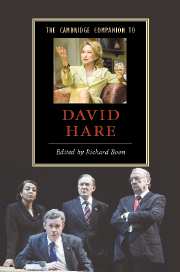15 - ‘Theatre and anti-theatre’
David Hare and public speaking
from Part IV - Overviews of Hare
Published online by Cambridge University Press: 28 April 2008
Summary
It's always the content of the work that determines everything - which I say over and over again, and I know you don't believe me, but it's true!
Over the past four decades, David Hare has accompanied his work in theatre with a broad spectrum of other kinds of public intervention. These include his early reviews for the theatre magazine Plays and Players in the late 1960s, his plethora of articles and interviews, his contribution to platform discussions, the prefaces to his published plays, his diary on acting and, most distinctively, the virtuoso lectures and speeches that he has given with increasing frequency, in a variety of speaking contexts, since the late 1970s. Without doubt, Hare's public speaking has functioned time and again to reiterate and elaborate his sense of the purpose and ethical value of theatre in changing political contexts; this, in turn, has helped to fashion his stature as public figure and latter-day 'man of letters' in the tradition of Bernard Shaw and John Osborne.
This essay attempts to fathom the relationship between Hare’s playwrighting and his non-theatrical work, exploring how the latter has expressed a unified set of preoccupations about the nature of his theatre’s engagement with historical and contemporary political realities. Our aim is to examine that which is both notable and intriguing about Hare’s numerous commentaries on performance: namely, the sharply anti-theatrical rhetoric that permeates many of his speech acts. Our hypothesis is that Hare’s long-standing commitment to the pure, transparent and direct communication of subject matter in performance has led to his increasing discomfiture with the mediating discourses of theatre and, consequently, to his reification of the lecture format as the preferred mode of public address both on and off the stage.
- Type
- Chapter
- Information
- The Cambridge Companion to David Hare , pp. 236 - 249Publisher: Cambridge University PressPrint publication year: 2007
- 3
- Cited by

